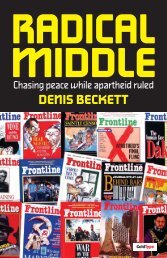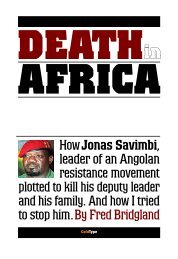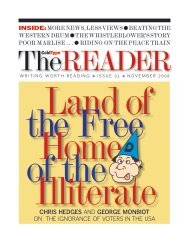UPDATED - ColdType
UPDATED - ColdType
UPDATED - ColdType
- TAGS
- updated
- coldtype
- coldtype.net
Create successful ePaper yourself
Turn your PDF publications into a flip-book with our unique Google optimized e-Paper software.
EMBEDDED: WEAPONS OF MASS DECEPTION<br />
RTL. The German network also made less of a<br />
switch toward more positively-toned coverage,<br />
as the military success of the American operation<br />
became apparent. In the discussion on<br />
whether or not the war was justified, ARD and<br />
ZDF ignored the fact that Anglo-Saxon experts<br />
on international law did not agree with their<br />
German colleagues. ARD in particular focused<br />
its coverage heavily on anti-war protests. ZDF<br />
led in reporting on the issue of the allies ignoring<br />
popular will worldwide.<br />
On the other hand, the topic ‘Dictatorship in<br />
Iraq’ only played a noticeable role in the Heute<br />
Journal. The question whether the intervention<br />
would result in liberating Iraq was practically<br />
left out of the coverage in the first two weeks of<br />
war.<br />
With the benefit of hindsight: did German TV<br />
journalists do a better job than their American<br />
colleagues? Editors and executives of German<br />
TV stations think so: “Better than during the<br />
first gulf war in 1991,” this is how representatives<br />
of ARD, ZDF and RTL assessed their coverage of<br />
the war in Iraq in the German financial paper<br />
Handelsblatt on April 11th.<br />
‘Better’ does not necessarily mean good, however;<br />
nor even good enough. The analysis of<br />
German TV news coverage on the war in Iraq<br />
reveals the basic journalistic decisions that were<br />
taken: Which issues were important to them in<br />
international comparisons, and how they chose<br />
to describe the situation.<br />
For the German media, the war was a megaevent<br />
that was given more coverage that the catastrophic<br />
Elbe flood of the past summer, a major<br />
story in Germany. Almost two thirds of the news<br />
coverage broadcast during the first week of the<br />
war dealt with Iraq, and this does not even take<br />
274<br />
into account a large number of special news specials.<br />
By the end of March the exceeded that on<br />
the Kosovo war in 1999.<br />
In comparison, in the last week before the 2002<br />
German parliamentary elections, the latter<br />
received only half as much attention as the war<br />
in its first week. The leader in the ranking was<br />
private broadcaster RTL Aktuell, which had<br />
practically eliminated all non-war reporting – a<br />
marked difference from how it covered the<br />
Kosovo conflict. The dominance of this issue cannot<br />
be explained solely in terms of its relevance.<br />
First: The war did not come as a surprise: Failing<br />
diplomacy in Washington, Paris and Berlin as<br />
well as the poker game played in Baghdad made<br />
it seem inevitable for months. The German federal<br />
government’s loudly announced goal to<br />
prevent the war at the eleventh hour was at best<br />
an indication of the unrealistic assessment of its<br />
negotiating power.<br />
Second: German soldiers were not involved,<br />
they did not fight or die in Iraq. It is true that<br />
German interests were at stake in regard to<br />
global security and oil. But those key topics were<br />
missing from discussion.<br />
Third: Facts from the news front were in short<br />
supply, for reasons mentioned above.<br />
Fourth: ‘Solidarity with the suffering Iraqis’ as<br />
a reason for the strong media interest would be<br />
little more than hypocrisy, at least when taking<br />
Chechnya into account; and also, in retrospect,<br />
from the Iraqi perspective, whose suffering<br />
under the dictatorship was always of marginal<br />
importance to the German news media.<br />
Fifth: Outlawing war might have been a noble<br />
goal in and of itself. But that was rarely analyzed<br />
along with what the intervention might mean for<br />
future wars and threats. US arguments pointing

















